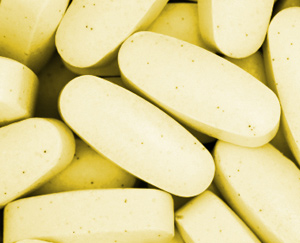Search Healthnotes
- By Maureen Williams, ND
Choline: An Essential B-Complex Nutrient?
Choline is a common ingredient in multivitamin and B-complex preparations, yet many people don’t know what it is or why they might need it. A new report published in the Journal of the American Dietetic Association set out to demystify choline, clarifying its important roles in maintaining liver health, preventing neural tube defects, and possibly preserving healthy brain function as we age. The report suggests that choline is appropriately designated an “essential” nutrient—necessary for health, but needed to be obtained through diet in order to get beneficial amounts, since the body doesn’t produce enough.
Despite the body’s ability to produce some choline, a choline-deficient diet has been shown to have detrimental effects on health
The unique nature of choline
Choline is a component of molecules known as phospholipids. These unusual molecules have heads that are attracted to water (hydrophilic) and tails that are water-repellent (hydrophobic), making them uniquely suited to form the basis of cell membranes throughout the body. Choline has many important functions, including regulating cell-to-cell communication and movement of biochemicals into and out of cells.Choline can be made in the body through a process that requires the amino acid methionine, vitamins B12 and B6, folate, and betaine (the oxidized form of choline), but we usually get most of the choline we need from food. Egg yolks, soybeans, and organ meats like beef liver are rich sources (mainly in the form of lecithin). Fish, chicken, wheat germ, butter, and some vegetables, nuts, seeds, legumes, and whole grains also contain lecithin, and lecithin is widely used as a food additive.
Part of the recipe for good health
Despite the body’s ability to produce some choline, a choline-deficient diet has been shown to have detrimental effects on health. Fatty liver disease is a major consequence of choline deficiency, and early research suggests that low choline intake during pregnancy increases the risk of neural tube defects.
On balance, the evidence shows that getting enough choline is necessary for good health, and the value of supplemental choline for specific health conditions deserves further exploration.
The science behind choline
The report reviewed the evidence supporting three popular health claims for choline and lecithin supplements:
- Heart disease. Adequate choline intake keeps homocysteine levels low and promotes healthy metabolism of cholesterol, but researchers have found no association between dietary choline and cardiac risk. The effect of choline supplements on heart disease is unclear.
- Memory loss. Choline is necessary for normal nerve cell function and to make acetylcholine, an important neurotransmitter. Lecithin supplements have been found to improve memory and cognitive function in people with memory problems and Alzheimer’s disease in some studies, but not in others.
- Cancer prevention. Although some animal studies have linked choline deficiency with cancer, scientists have not been able to demonstrate such a link in humans.
Other evidence shows that choline supplements may help prevent gallstones and reduce liver damage in people exposed to harmful chemicals, excessive alcohol, and certain viruses. “Choline is a dietary and cellular component that plays important roles in the metabolism and normal functioning of cells,” the report states. “There is an increasing body of evidence that may eventually lead to the establishment of choline as an essential nutrient in humans.”
(J Am Diet Assoc 2010;110:1162–5)










